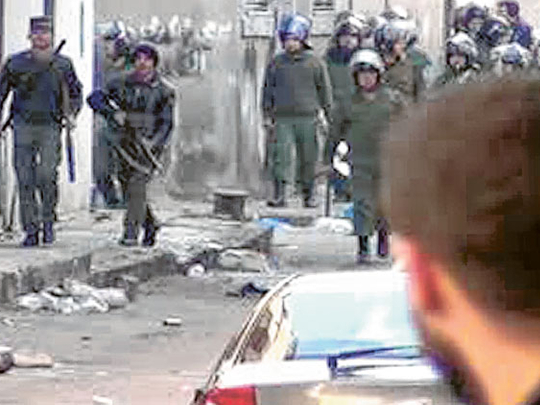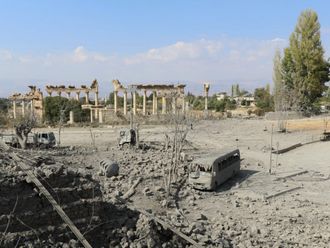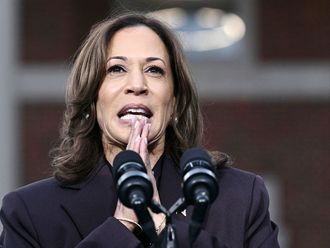
Damascus: Activists piled pressure on Arab monitors yesterday to do more to prevent Syrian forces from pursuing their brutal crackdown against pro-democracy protesters, amid fresh criticism of the observer mission.
The Arab League insisted, however, it would not back down from the operation, which Damascus accepted after weeks of stalling, and said that a new batch of monitors will head to Syria on Thursday to join 66 already there.
On the ground, two more civilians were reportedly killed yesterday by gunfire from security forces, including a farmer who was struck by a stray bullet as regime agents raided a village near Damascus looking for suspects.
There was also violence in the province of Idlib where mutinous soldiers carried out daring attacks on three military positions, abducting loyalist troops and killing and wounding a number of others.
Brutal start to 2012
The Syrian Observatory for Human Rights which reported yesterday's deaths and unrest said five people were killed on Sunday, including a seven-year-old boy, marking a brutal start to the New Year.
The violence reported yesterday could not be independently verified because foreign journalists are not permitted to work freely inside Syria.
Protesters on Sunday greeted 2012 with fireworks and fresh protests calling for the ouster of President Bashar Al Assad, while accusing the Arab League observers of not doing enough to end his regime's brutal crackdown.
Israel's Defence Minister Ehud Barak told parliament's foreign affairs and defence committee that "the [Al] Assad family has no more than a few weeks to remain in control in Syria," in remarks quoted by the committee spokesman.
On Sunday, the Arab Parliament, an advisory body of the 22-member Arab League, said monitors should be immediately withdrawn from Syria because they failed to halt the government's deadly crackdown on dissent.
"We are seeing an increase in violence, more people are being killed including children ... and all this in the presence of Arab League monitors, which has angered the Arab people," said speaker Salem Al Diqbassi.
He urged Arab League chief Nabeel Al Arabi to "immediately pull out the Arab observers, considering the continued killing of innocent civilians by the Syrian regime".
The Local Co-ordination Committees (LCC) network of activists echoed the disenchantment with the observers, saying they were not doing enough to protect civilians in flashpoints, namely the Damascus suburb of Daraya.
Daraya residents on Sunday turned out in large numbers on the streets to welcome observers when they heard news of their arrival in their district but "were met with tear gas, live ammunition, brutal attacks", the LCC said.
"Daraya will not break and will not back down... [and] calls on the Arab League observers to fulfil their duties and restore their credibility which was shaken after their absence today in the town squares," the LCC said.
In a statement, it urged the monitors to witness repression by "the tyrannical regime's security forces", accusing them of abducting a wounded activist, Mohammad Anwar Al Dabbas, from his hospital bed. Regime opponents have also accused authorities of keeping monitors on a short leash.
Monitors guarded
"The observers stayed too long in their hotels before being allowed to go out and their visits are monitored by regime security agents," opposition Syrian National Council member Jaber Al Shufi told Al Arabiya television.
The Arab League has declined so far to comment on the mission but said more observers will head to Syria, where state media reported that monitors pursued their mission yesterday with more visits to flashpoint centres.
"Around 20 more observers will head to Damascus from Saudi Arabia, Bahrain and Tunisia," Syria operations chief Adnan Khodeir said on Sunday in Cairo.
The monitors are on a month-long mission that kicked off on December 26.
Syria agreed to allow the deployment of observers as part of a deal calling for the withdrawal of the military from residential districts, a halt to violence against civilians and the release of detainees.
But the mission has hit snags and triggered controversy.
Al Dabi controversy
Mission chief General Mohammad Ahmad Mustafa Al Dabi has disputed a YouTube video footage showing an Arab monitor accusing Syrian authorities of posting snipers on rooftops and demanding their removal.
Al Dabi said the remarks were hypothetical.
A veteran Sudanese military intelligence officer, Al Dabi is a controversial figure because he served under Sudan's President Omar Al Bashir, who is wanted by the International Criminal Court for alleged war crimes.
The Saudi-owned newspaper Al Hayat published a blistering editorial yesterday under the headline ‘The Dabi Scandal', criticising the Arab League for choosing him to head the mission.
The London-based daily said Al Dabi "belongs to an army that has carried out war crimes in Darfur. Amnesty International holds him responsible for the arbitrary arrests and torture of many people in Sudan".












